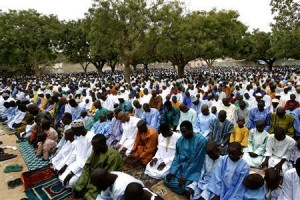Islamic Traditions Influence Lent in Senegal
March 09, 2007
Dakar
The population of the West African nation of Senegal is mostly Muslim, but people of different faiths intermingle freely, and their religious traditions have become intertwined as well. As Naomi Schwarz reports from Dakar, religious celebrations, like the Christian observance of Lent, have been influenced by Muslim traditions.
In a noisy cement-walled classroom next to Dakar’s main cathedral, a local choir is rehearsing a song for an upcoming concert.
Although the choir is Catholic, the song is in Arabic.
It focuses on the continuing dialogue between Muslims and Christians in Senegal, says Jean-Paul Sombou, a member of the choir.
More than 90 percent of the country is Muslim, while only about five percent are Christian, mostly Roman Catholic.
But communities are often religiously mixed. Muslims invite Christians to share their holiday celebrations and vice versa.
Ndeye Binta Lô, a Muslim, is an instructor at a tailoring school in Dakar.
She says she grew up with Christians, and they are her sisters.
Sometimes these religious interconnections actually influence the way that holidays are celebrated across religions.
Marie-Simone Mbengue is a student at Lo’s school. She is a devout Catholic, and she is fasting for the 40 days of Lent, which does not include Sundays.
“Yesterday [Monday] was hard, because I ate on Sunday,” she noted. “I had breakfast and lunch, and then yesterday I did not eat. I was tired.”
Lent is the period that precedes Easter. It commemorates the forty days Christians say Jesus spent in the desert prior to the crucifixion.
Mbengue describes how Catholics observe the period.
“We sacrifice, pray, and we do good deeds to show our devotion to Jesus,” she said. “We cannot suffer as much as him, but we should do the maximum.”
Fasting is common for Lent, but scholars say these fasts can take different forms.
Some Christians choose to abstain from meat and animal products for all forty days or on Fridays. Others limit the total amount of food they eat in a day.
Abbé Jacques Seck, a Senegalese Christian historian, says when he was young, he remembers seeing people who would snack for two tiny meals, and eat one regular meal in the evening.
But Mbengue’s fast, like those of many Senegalese Catholics, is more strict than that. She abstains from all food and liquid during the day, and eats only one meal, after sunset.
In this way, Mbengue’s fast resembles the month-long fast that Muslims observe for Ramadan.
Seck says this is a recent development.
He says such a strict fast is not necessary, but some Senegalese have started the practice, because they want to show they are as serious in their faith as Muslims are in theirs.
Professor of Islamic Civilization, Abdoul Aziz Kébé, says he has seen some priests explicitly give the Muslim example to their congregations.
“One of my friends, who is a Christian, Abbe Leon Diouf, told to the young Christians, telling them it is important for them to try to be as serious as young Muslims during the fasting time, during the Ramadan.”
Religion scholars say this is one important way that traditions get transmitted across cultures. But they say sometimes traditions also pass subconsciously, and people are not even aware they have been influenced.
Mbengue says she does not see her fast as similar to a Muslim fast.
“We are not the same,” she noted. “The type of things they do, we do not do the same as them.”
Islam came to West Africa in the 11th century and spread widely in the 1700s. Christianity spread later, starting in the mid-1800s. That means Catholic converts were already familiar with the Ramadan style of fasting.
Scholars say this style of fasting may not seem in any way Muslim to people immersed in West African culture. It can simply be seen as the way to engage in a sustained period of religious self-denial.


















